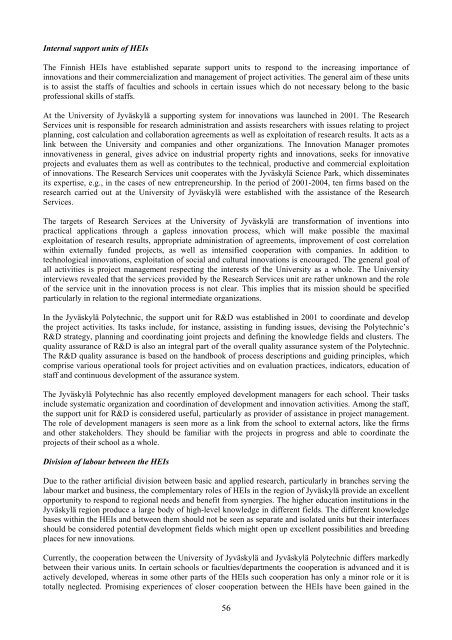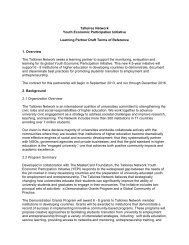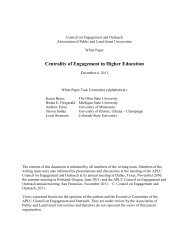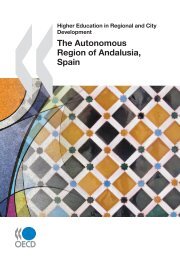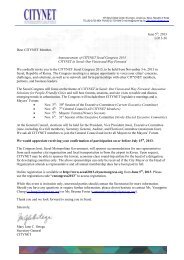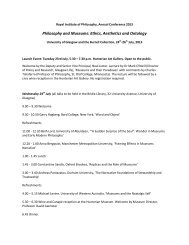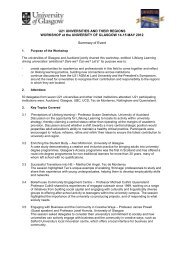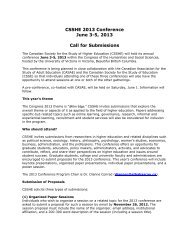the organizational complexity and lack of knowledge about funding opportunities and their availability.Small firms might also see the University of Jyväskylä as an inappropriate partner because they do not haveenough information about what opportunities there might be to utilize the research and knowledge basegenerated by the University and what the value added received from cooperation might be. Thus, for thosefirms the Polytechnic is often easier to approach. However, the R&D -activities of the Jyväskylä Polytechnicare rather new and still taking shape and more time is needed to fully integrate them into the region, whichhas partly restricted the extension of firm-level cooperation. As a whole, according to the interviews theoperations of the HEIs are rather poorly known in the region of Jyväskylä, which prevents firms and otherregional actors from engaging in R&D cooperation effectively.The main challenges recognized by firms, other regional actors and the HEIs themselves are how to make theHEIs’ activities and output externally more visible and concrete in an attractive way and how to approach afirm as a whole. Firstly, the HEIs should clearly identify their priorities and define their profiles. Secondly,they should seek to better inform the firms and other regional actors on their knowledge and know-how. Inthe process of information transfer, the intermediate organizations could also have an important role.According to the results of the questionnaire the most useful channels for the transfer of information areconsidered to be the intensive cooperation and interaction with regional actors, more effectivecommunication and active participation in the seminars and other meetings where it is possible to presenttheir own activities. However, it is clear that the increasing information transfer is only one part of therelationship building. In addition, the actors have to identify a common mission, mutual trust and addedvalue generated by the cooperation.One drawback of the R&D –projects of the Jyväskylä Polytechnic and University of Jyväskylä is their loosetie to the development of the firms’ processes as a whole. In general, firms need an individual-level approachwhich focuses on the firm as a whole. Only this allows recognizing those specific needs of the firms whichcannot be expressed or recognized by the firms themselves. The differences between expressed and latentneeds/potential often stem from the difficulties that many small and medium-sized firms have in diagnosingthe external support requirements of their business. Customized support and services for different types offirms, which take account of their life-cycle path, their economic and personnel resources, the capability oftheir owners and managers (concerning the knowledge in the fields of substance, business andentrepreneurship) are becoming more and more important. This could be supported by the development ofsome kind of a customer management system.It would be essential to solve the obstacles which the HEIs and firms are struggling with and stimulatecooperation between them. Besides the collaborative efforts of the HEIs more intensive cooperation alsorequires that the firms themselves are committed to the process and share a common goal. At best, thecooperative research projects between the HEIs and firms in the region allow for both of them to go beyondtheir own resource limits, which also means that they can spread their risks and take advantage of a numberof funding opportunities.4.7 Interfaces facilitating knowledge utilization and transferThe regional innovation system consists of several actors taking care of the various phases of the innovationprocess. The main actors are the HEIs, intermediate organizations and firms. The Ministry of Educationplaces a strong emphasis on the cooperation between polytechnics and universities based on theircomplementary functions and the strengths of each institution. The cooperation between HEIs andintermediate organizations is also seen as a challenge. The Ministry of Education encourages regional actorsto create an operational mode based on the science park concept, which gathers firms, intermediateorganizations and HEIs together in an effective way (discussion with the representatives of the Ministry ofEducation, 12 Sep 2005).The university should be seen as a producer of high level basic research and education. In turn, thepolytechnic is more acquainted with professional education, development of working life and testingprocesses. The intermediate organizations are responsible for the commercialization and diffusion ofresearch based innovations into the market. In the region of Jyväskylä the division of work between thedifferent actors is considered necessary but it is still taking shape.55
Internal support units of HEIsThe Finnish HEIs have established separate support units to respond to the increasing importance ofinnovations and their commercialization and management of project activities. The general aim of these unitsis to assist the staffs of faculties and schools in certain issues which do not necessary belong to the basicprofessional skills of staffs.At the University of Jyväskylä a supporting system for innovations was launched in 2001. The ResearchServices unit is responsible for research administration and assists researchers with issues relating to projectplanning, cost calculation and collaboration agreements as well as exploitation of research results. It acts as alink between the University and companies and other organizations. The Innovation Manager promotesinnovativeness in general, gives advice on industrial property rights and innovations, seeks for innovativeprojects and evaluates them as well as contributes to the technical, productive and commercial exploitationof innovations. The Research Services unit cooperates with the Jyväskylä Science Park, which disseminatesits expertise, e.g., in the cases of new entrepreneurship. In the period of 2001-2004, ten firms based on theresearch carried out at the University of Jyväskylä were established with the assistance of the ResearchServices.The targets of Research Services at the University of Jyväskylä are transformation of inventions intopractical applications through a gapless innovation process, which will make possible the maximalexploitation of research results, appropriate administration of agreements, improvement of cost correlationwithin externally funded projects, as well as intensified cooperation with companies. In addition totechnological innovations, exploitation of social and cultural innovations is encouraged. The general goal ofall activities is project management respecting the interests of the University as a whole. The Universityinterviews revealed that the services provided by the Research Services unit are rather unknown and the roleof the service unit in the innovation process is not clear. This implies that its mission should be specifiedparticularly in relation to the regional intermediate organizations.In the Jyväskylä Polytechnic, the support unit for R&D was established in 2001 to coordinate and developthe project activities. Its tasks include, for instance, assisting in funding issues, devising the Polytechnic’sR&D strategy, planning and coordinating joint projects and defining the knowledge fields and clusters. Thequality assurance of R&D is also an integral part of the overall quality assurance system of the Polytechnic.The R&D quality assurance is based on the handbook of process descriptions and guiding principles, whichcomprise various operational tools for project activities and on evaluation practices, indicators, education ofstaff and continuous development of the assurance system.The Jyväskylä Polytechnic has also recently employed development managers for each school. Their tasksinclude systematic organization and coordination of development and innovation activities. Among the staff,the support unit for R&D is considered useful, particularly as provider of assistance in project management.The role of development managers is seen more as a link from the school to external actors, like the firmsand other stakeholders. They should be familiar with the projects in progress and able to coordinate theprojects of their school as a whole.Division of labour between the HEIsDue to the rather artificial division between basic and applied research, particularly in branches serving thelabour market and business, the complementary roles of HEIs in the region of Jyväskylä provide an excellentopportunity to respond to regional needs and benefit from synergies. The higher education institutions in theJyväskylä region produce a large body of high-level knowledge in different fields. The different knowledgebases within the HEIs and between them should not be seen as separate and isolated units but their interfacesshould be considered potential development fields which might open up excellent possibilities and breedingplaces for new innovations.Currently, the cooperation between the University of Jyväskylä and Jyväskylä Polytechnic differs markedlybetween their various units. In certain schools or faculties/departments the cooperation is advanced and it isactively developed, whereas in some other parts of the HEIs such cooperation has only a minor role or it istotally neglected. Promising experiences of closer cooperation between the HEIs have been gained in the56
- Page 1 and 2:
OECD/IMHE ‐ Supporting thecontrib
- Page 3 and 4:
SUMMARYTogether with 13 other regio
- Page 5 and 6: 8.2 Increasing the regional effecti
- Page 7 and 8: I INTRODUCTION1.1 Strengthening the
- Page 9 and 10: development. The aim is that region
- Page 11 and 12: The self-evaluation considered here
- Page 13 and 14: densely populated cities in Finland
- Page 15 and 16: 1,9 %1,7 %1,5 %1,3 %Population chan
- Page 17 and 18: The share of jobs in primary produc
- Page 19 and 20: New pillars of future’s developme
- Page 21 and 22: Jyväskylä0,60,91,11,0Central Finl
- Page 23 and 24: 2.4 Governance StructureMunicipalit
- Page 25 and 26: of its development outside the cent
- Page 27 and 28: III CHARACTERISTICS OF THE HIGHER E
- Page 29 and 30: continuing education and open unive
- Page 31 and 32: The Science and Technology Policy C
- Page 33 and 34: 3.2 Regional dimension within the n
- Page 35 and 36: order to respond to the challenges
- Page 37 and 38: 14001200Master's degreesDoctoratesN
- Page 39 and 40: 900800Youth graduatedAdult graduate
- Page 41 and 42: provide information for the basis o
- Page 43 and 44: CabinetParliamentSTPCSteering (andf
- Page 45 and 46: 5,04,0Billion euros3,02,01,00,083 8
- Page 47 and 48: The number of refereed articles is
- Page 49 and 50: Centre of expertisePaper industryBi
- Page 51 and 52: The Institute for Environmental Res
- Page 53 and 54: and systematic gradually progressin
- Page 55: are seen to be very important chann
- Page 59 and 60: of interviewed HEI staffs, the coop
- Page 61 and 62: areas of the region’s Centre of E
- Page 63 and 64: system of Jyväskylä and the HEIs
- Page 65 and 66: V CONTRIBUTION OF TEACHING AND LEAR
- Page 67 and 68: esources to establish new activitie
- Page 69 and 70: The main problem for the Finnish la
- Page 71 and 72: longer. 2.5% of the Jyväskylä Pol
- Page 73 and 74: activities. As a part of the new qu
- Page 75 and 76: education programmes consisting of
- Page 77 and 78: the TE-Centre of Central Finland an
- Page 79 and 80: practices in the provision of educa
- Page 81 and 82: Reason forskillupgradingDescription
- Page 83 and 84: Strengths+ HEIs are actively confro
- Page 85 and 86: taxation, to lower the unemployment
- Page 87 and 88: Box 6.2 The WIRE -projects: Support
- Page 89 and 90: indoor ice-skating rink, the Rauhal
- Page 91 and 92: The School of Cultural Studies at t
- Page 93 and 94: the number of registered customers
- Page 95 and 96: Box 6.9 Environmental management in
- Page 97 and 98: Strengths+ The significance of HEIs
- Page 99 and 100: eferring to the regional developmen
- Page 101 and 102: Key topics relating to changes in t
- Page 103 and 104: participation in the decision makin
- Page 105 and 106: in the strategy-making process. The
- Page 107 and 108:
7.5 Critical points in promoting th
- Page 109 and 110:
7.Cooperation in strategies concern
- Page 111 and 112:
egion is according to national and
- Page 113 and 114:
oundaries for further developmental
- Page 115 and 116:
joining resources and operations by
- Page 117 and 118:
Discussion proposal 15: To ensure d
- Page 119 and 120:
achieved by the horizontal utilizat
- Page 121 and 122:
Appendix 2 Information on data used
- Page 123 and 124:
and finding synergy between the oth
- Page 125 and 126:
School of BusinessRoleThe School of
- Page 127 and 128:
The challenge of the school from re
- Page 129 and 130:
developing wellness and environment
- Page 131 and 132:
Faculty of EducationRoleThe Faculty
- Page 133 and 134:
and/or graduation thesis is a signi
- Page 135 and 136:
Areas of strength and prioritising
- Page 137 and 138:
Agora Center’s partners from the
- Page 139 and 140:
Currently the priority of ITRI’s
- Page 141 and 142:
Weak spots and areas to develop in
- Page 143 and 144:
Employment and Economic Development
- Page 145 and 146:
Appendix 3 Analysis of the most sig
- Page 147 and 148:
Appendix 4 Regional effects (input-
- Page 149 and 150:
The overall value of production cre
- Page 151 and 152:
Appendix 5 Reform of regional struc
- Page 153 and 154:
Appendix 7 Provision of education i
- Page 155 and 156:
Appendix 8 Statistical information
- Page 157 and 158:
Appendix 10 Statistics on financing
- Page 159 and 160:
Appendix 12 Labour market activity
- Page 161 and 162:
Appendix 14 Master’s Programmes a
- Page 163 and 164:
Uusiutuvan energian tutkimusohjelma
- Page 165 and 166:
BIBLIOGRAPHYAcademy of Finland (200


